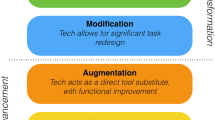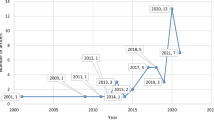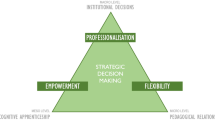Abstract
This article explores the potential of digital technology to advance democratic citizenship. Drawing on critical theory and following a critical, comparative qualitative study which examined the relationships among digital technology, education, and democracy in the US and Israel, the authors explore epistemological assumptions of teaching and learning with digital tools. The article examines the tension between the promise of digital technology to transform education, and the instrumental hegemony of the neoliberal imperative. At the heart of this article, the authors contend that current teachers’ understanding of using digital technology, and the practices used in classrooms constrain the promotion of digital citizenship. The authors argue that transforming education through digital technology and advancing civic aims require epistemological transformation which will move beyond instrumental understanding of digital tools. They conclude with a recommendation of a theoretical framework for digital citizenship.

Similar content being viewed by others
Notes
We refer digital technology to computers, tablets, smartphones, videos, presentations, digital whiteboards, and any accessible digital device that enables the use of Information and Communication Technology (ICT) for teaching, learning, communicating, and acquiring information.
References
Abbitt, J. T. (2011). An investigation of the relationship between self-efficacy beliefs about technology integration and technological pedagogical content knowledge (TPACK) among preservice teachers. Journal of Digital Learning in Teacher Education, 27(4), 134–143.
Angelo, T. (2012). Designing subjects for learning: Practical, research-based principles and guidelines. In L. Hunt & D. Chalmers (Eds.), University teaching in focus: A learning-centered approach (pp. 93–111). ACER Press.
Ball, S. J. (2012). Global education INC.: New policy networks and the neo-liberal imaginary. Routledge.
Ben-Porath, S. (2012). Citizenship as shared fate: Education for membership in a diverse democracy. Educational Theory, 62(4), 381–395. https://doi.org/10.1111/j.1741-5446.2012.00452.x
Bernstein, R. J. (1978). The restructuring of social and political theory. University of Pennsylvania Press.
Biesta, G. (2010). Good education in an age of measurement. Paradigm.
Brown, W. (2005). Edgework: Critical essays on knowledge and politics. Princeton University Press.
Brown, W. (2015). Undoing the demos. Zone Books.
Brookfield, S. (2010). Learning democratic reason: The adult education program of Jürgen Habermas. In M. Murphy & T. Fleming (Eds.), Habermas, critical theory and education (pp. 125–136). Routledge.
Buckingham, D. (2007). Beyond technology: Children’s learning in the age of digital culture. Polity.
Buckingham, D. (2015). Defining digital literacy: What do young people need to know about digital media? Nordic Journal of Digital Literacy, 10, 21–35.
Canella, G. S., & Lincoln, Y. S. (2012). Deploying qualitative methods for critical social purposes. In S. Steinberg & G. S. Canella (Eds.), Critical qualitative reader (pp. 104–114). Peter Lang.
Carspecken, P. F. (1996). Critical ethnography in educational research: A theoretical and practical guide. Routledge.
Carspecken, P. F. (2012). Basic concepts in critical methodological theory: Action, structure and system within a communicative pragmatic framework. In S. Steinberg & G. S. Canella (Eds.), Critical qualitative reader (pp. 43–66). Peter Lang.
Creswell, J. W. (2011). Qualitative inquiry & research design: Choosing among five approaches. Sage Publications.
Deakin Crick, R., & Joldersma, C. W. (2007). Habermas, lifelong learning and citizenship education. Study in Philosophy and Education, 26, 77–95.
Ellis, M. (2016). The critical global educator: Global citizenship education as sustainable development. Routledge.
Emejulu, A., & McGregor, C. C. (2019). Towards a radical digital citizenship in digital education. Critical Studies in Education, 60(1), 131–147.
Ertmer, P. A., Ottenbreit-Leftwich, A. T., Sadik, O., Sendurur, E., & Sendurur, P. (2012). Teacher beliefs and technology integration practices: A critical relationship. Computers & Education, 59(2), 423–435. https://doi.org/10.1016/j.compedu.2012.02.001
Feenberg, A. (1991). Critical theory of technology. Oxford University Press.
Feenberg, A. (2010). Between reason and experience. MIT Press.
Ford, M. P., & Opitz, M. F. (2015). Helping young children discover the joy of learning. Review of Human Factor Studies, 21(1), 27–42.
Gardner-McTaggart, A., & Palmer, N. (2018). Global citizenship education, technology, and being. Globalisation, Societies and Education, 16(2), 268–281.
Giroux, H. A. (2003). The abandoned generation: Democracy beyond the culture of fear. Palgrave Macmillan.
Giroux, H. A. (2011). The promise of critical pedagogy in the age of globalization: Toward a pedagogy of democratization. In H. H. Giroux (Ed.), On critical pedagogy (pp. 69–85). The Continuum International Publishing Group.
Graham, S., Capizzi, A., Harris, K. R., Hebert, M., & Morphy, P. (2014). Teaching middle school students: A national survey. Reading and Writing, 27, 1015–1042. https://doi.org/10.1007/s11145-013-9495-7
Hammond, M. (2015). A Habermasian perspective on joint meaning making online: What does it offer and what are the difficulties? International Journal of Computer-Supported Collaborative Learning, 10(3), 223–237. https://doi.org/10.1007/s11412-015-9215-1
Habermas, J. (1972). Knowledge and human interests (J. Shapiro, Trans.). Boston, MA: Beacon Press.
Habermas, J. (1973). Theory and practice (J. Viertel, Trans.). Boston, MA: Beacon Press.
Habermas, J. (1987). The theory of communicative action, volume. 2 (T. McCarthy, Trans.). Boston, MA: Beacon Press.
Hinrichsen, J., & Coombs, A. (2013). The five resources of critical digital literacy: A framework for curriculum integration. Research in Learning Technology, 21, 1–16. https://doi.org/10.3402/rlt.v21.21334
Honneth, A. (1995). The fragmented world of the social: Essays in social and political philosophy. (C.W. Wright, ed.). State University of New York Press.
Horizon Report. (2014). Higher education edition. NMC. http://www.nmc.org/publications/2014-horizon-report-higher-ed
Horkheimer, M. (1972). Critical theory; selected essays. Herder and Herder Press.
Ichilov, O. (2009). The retreat from public education [electronic resource] : global and Israeli perspectives. Springer. https://doi.org/10.1007/978-1-4020-9570-21
Israeli Ministry of Education. (2010). 2010–2015 Guide for the Digitized School. http://sites.education.gov.il/cloud/home/tikshuv/Documents/mdrich_ashalem_tikshuv.pdf
Knight-Abowitz, K., & Harnish, J. (2006). Contemporary discourses of citizenship. Review of Educational Research, 76(4), 653–690. https://doi.org/10.3102/00346543076004653
Kohn, A. (2009). When 21st-century schooling just isn’t good enough: A modest proposal. District Administration, 45(2), 38–39.
Kvale, S., & Brinkmann, S. (2009). InterViews: Learning the craft of qualitative research interviewing. Sage Publications.
Labaree, D. F. (1997). Public goods, private goods: The American struggle over educational goals. American Educational Research Journal, 34(1), 39–81.
Li, Y., Garza, V., Keicher, A., & Popov, V. (2019). Predicting high school teacher use of technology: Pedagogical beliefs, technological beliefs and attitudes, and teacher training. Technology, Knowledge and Learning, 24(3), 501–518. https://doi.org/10.1007/s10758-018-9355-2
Mamlok, D. (2017). Digital technology and education in the age of globalization [Doctoral dissertation, Miami University], Ohio. http://rave.ohiolink.edu/etdc/view?acc_num=miami1492461952509602.
McGrew, S., Breakstone, J., Ortega, T., Smith, M., & Wineburg, S. (2018). Can students evaluate online sources? learning from assessments of civic online reasoning. Theory and Research in Social Education, 46(2), 165–193. https://doi.org/10.1080/00933104.2017.1416320
Means, A. J. (2018). Learning to Save the future: Rethinking education and work in an era of digital capitalism. Routledge.
Mikander, P. (2016). Globalization as continuing colonialism: Critical global citizenship education in an unequal world. Journal of Social Science Education, 15(2), 70–79. https://doi.org/10.4119/UNIBI/jsse-v15-i2-1475
Mishra, P., & Koehler, M. J. (2006). Technological pedagogical content knowledge: A framework for teacher knowledge. Teachers College Record, 108(6), 1017–1054. https://doi.org/10.1111/j.1467-9620.2006.00684.x
Montgomery, J. (2007). The logic of neo-liberalism and the political economy of consumer debt- led growth. In S. Lee & S. McBride (Eds.), Neo-liberalism, state power and global governance (pp. 157–172). Springer.
Murphy, M. (2010). Forms of rationality and public sector reform: Habermas, education and social policy. In M. Murphy & T. Fleming (Eds.), Habermas, critical theory and education (pp. 78–93). Routledge.
Noble, D. D. (1996). Mad rushes into the future: The overselling of educational technology. Educational Leadership, 54(3), 18–23.
OECD [The Organization for Economic Cooperation and Development]. (2015). Students, computers and learning: Making the connection. Paris: OECD Publishing. Retrieved on March 29, 2020, from: http://www.oecd.org/publications/students-computers-and-learning-9789264239555-en.htm
Patton, M. Q. (1990). Qualitative evaluation and research methods. Sage.
Pangrazio, L. (2016). Reconceptualising critical digital literacy. Discourse Studies in the Cultural Politics of Education, 37(2), 163–174. https://doi.org/10.1080/01596306.2014.942836
Ravitch, D. (2011). The death and life of the great American school system: How testing and choice are undermining education. Basic Books.
Regan, K., Evmenova, A. S., Sacco, D., Schwartzer, J., Chirinos, D. S., & Hughes, M. D. (2019). Teacher perceptions of integrating technology in writing. Technology, Pedagogy and Education, 28(1), 1–19. https://doi.org/10.1080/1475939X.2018.1561507
Roberts-Mahoney, H., Means, A. J., & Garrison, M. J. (2016). Netflixing human capital development: Personalized learning technology and the corporatization of k-12 education. Journal of Education Policy, 31, 405–420. https://doi.org/10.1080/02680939.2015.1132774
Roehl, A., Reddy, S. L., & Shannon, G. J. (2013). The flipped classroom: An opportunity to engage millennial students through active learning strategies. Journal of Family & Consumer Sciences, 105(2), 44–49.
Rowan, L. (2017). Teachers’ beliefs about the impact of games on the academic and social experiences of diverse and at-risk children in schools: A Deleuzian perspective. Learning, Media and Technology, 42(3), 295–307. https://doi.org/10.1080/17439884.2016.1160925
Sahin, A., Top, N., & Delen, E. (2016). Teachers’ first-year experience with Chromebook laptops and their attitudes towards technology integration. Technology, Knowledge and Learning, 21(3), 361–378. https://doi.org/10.1007/s10758-016-9277-9
Saltman, K. J. (2014). Neoliberalism and corporate school reform: ‘Failure’ and ‘creative destruction.’ Review of Education, Pedagogy, and Cultural Studies, 36(4), 249–259. https://doi.org/10.1080/10714413.2014.938564
Saltman, K. J. (2017). Scripted bodies: Corporate Power, Smart Technologies, and the undoing of public education. Routledge.
Selwyn, N., Nemorin, S., & Johnson, N. (2017). High-tech, hard work: An investigation of teachers’ work in the digital age. Learning, Media and Technology, 42(4), 390–405. https://doi.org/10.1080/17439884.2016.1252770
Singer, N. (2016). Kahoot app brings urgency of a quiz show to the classroom. The New-York Times. http://www.nytimes.com/2016/04/17/technology/kahoot-app-brings-urgency-of-a-quiz-show-to-the-classroom.html
Slakmon, B. (2017). Educational technology policy in Israel. Pedagogy, Culture & Society, 25(1), 137–149. https://doi.org/10.1080/14681366.2016.1231709
Stitzlein, S. M. (2020). Learning how to hope. Oxford University Press.
Tewell, E. (2016). Toward the resistant reading of information: Google, resistant spectatorship, and critical information literacy. Portal Libraries and the Academy, 16(2), 289–310.
Tilak, S., & Glassman, M. (2020). Alternative lifeworlds on the internet: Habermas and democratic distance education. Distance Education, 41(3), 326–344. https://doi.org/10.1080/01587919.2020.1763782
Tondeur, J., van Braak, J., Guoyuan, S., Voogt, J., Fisser, P., & Ottenbreit-Leftwich, A. (2012). Preparing pre-service teachers to integrate technology in education: A synthesis of qualitative evidence. Computers & Education, 59, 134–144. https://doi.org/10.1016/j.compedu.2011.10.009
U.S. Department of Education (2010). Transforming American education: Learning powered by technology. National Education Technology Plan 2010. U.S. Department of Education.
U.S. Department of Education. (2017). Reimagining the role of technology in education: 2017 National Education Technology Plan Update. Education Publications Center.
Varenne, H. (2014). Comments on Tobin’s contribution to comparative research in anthropology and in education. Comparative Education, 16(2), 43–47.
Wajcman, J. (2015). Pressed for Time. The University of Chicago Press.
Wallace, M., Walker, J. D., Braseby, A. M., & Sweet, M. S. (2014). ’Now, what happens during class?’ using team-based learning to optimize the role of expertise within the flipped classroom. Journal on Excellence in College Teaching, 25(3–4), 253–273.
Waters, A. (Oct. 22, 2015). The algorithmic future of education. Hack Education. Retrieved on March 29, 2020 from: http://hackeducation.com/2015/10/22/robot-tutors
Williamson, B. (2013). The future of the curriculum. School knowledge in the digital age. MIT Press.
Wilson, T. S., & Santoro, D. A. (2015). Philosophy pursued through empirical research: Introduction to the special issue. Studies in Philosophy and Education, 34(2), 115–124. https://doi.org/10.1007/s11217-015-9460-9
Funding
The authors received no financial support for the research, authorship, and/or publication of this article.
Author information
Authors and Affiliations
Corresponding author
Ethics declarations
Conflicts of interest
We report that this manuscript has no potential conflict of interest.
Additional information
Publisher's Note
Springer Nature remains neutral with regard to jurisdictional claims in published maps and institutional affiliations.
Rights and permissions
About this article
Cite this article
Mamlok, D., Abowitz, K.K. 132 Words: A Critical Examination of Digital Technology, Education, and Citizenship. Tech Know Learn 27, 1237–1257 (2022). https://doi.org/10.1007/s10758-021-09540-3
Accepted:
Published:
Issue Date:
DOI: https://doi.org/10.1007/s10758-021-09540-3




